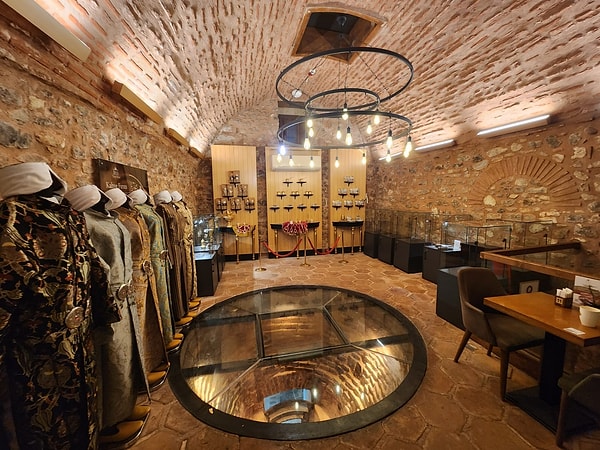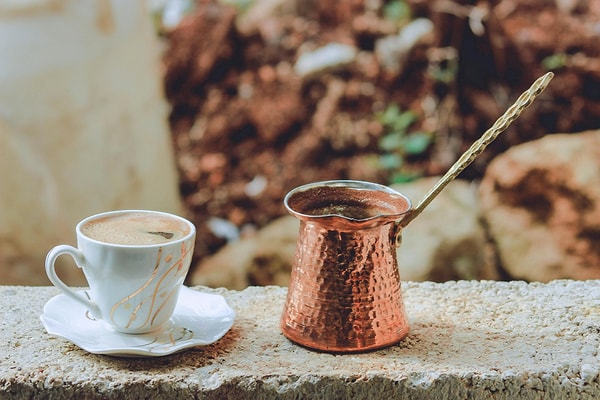Turkish Coffee Traditions: History, Culture, and Unique Flavors
More than just a beverage, Turkish coffee represents hundreds of years of cultural heritage, social interactions and refined artistry. From its preparation to its presentation, from the traditions surrounding it to its social meanings, it is a reflection of Turkish cultural identity. In 2013, UNESCO included this unique integrity in the Representative List of the Intangible Cultural Heritage of Humanity under the name 'Turkish Coffee Culture and Tradition'. So, what is Turkish coffee? What's so special about Turkish coffee? How is Turkish coffee different from regular coffee? And how to make Turkish coffee? Let's explore together...👇
The Origins of Turkish Coffee and Its Journey to the Ottoman Empire

Although the homeland of coffee is rumoured to be Abyssinia (Ethiopia), Yemen played an important role in its popularisation as a beverage. The Ottoman Empire was introduced to coffee in the 16th century, during the reign of Suleiman the Magnificent, when the Governor of Yemen, Özdemir Pasha, brought it to Istanbul or through Syrian merchants. Initially consumed around the palace and among the elite (the rank of 'Kahvecibaşı'), coffee spread to the general public over time.
Istanbul's First Coffee Houses: The Heart of Social Life

As coffee became widespread among the public, the first coffeehouses were opened in Tahtakale in 1554-1555. These places multiplied rapidly and became important social, cultural and intellectual centres where books were read, literary conversations were held, games were played, news was shared, and even political debates were held, creating a secular public space outside of traditional gathering spaces.
Bans and Fatwas: The Turbulent History of Coffee
The increasing popularity of coffee and coffeehouses led to their prohibition from time to time (during the reigns of Kanuni, Murad III, and Murad IV) for reasons such as being a hotbed of gossip and being considered a recreational substance. However, the bans were generally ineffective, and coffee consumption regained legitimacy with the fatwas of scholars.
The Secrets That Make Turkish Coffee Unique: Preparation and Characteristics

The unique flavour of Turkish coffee begins with roasting quality Arabica beans, usually medium roasted, and most importantly, grinding them to a fine powder (finer than espresso). This fineness allows for intense flavour and aroma to be released in a short time, the grounds to settle to the bottom and form shapes suitable for fortune telling.
Traditionally, coffee and optional sugar are added to cold water measured in cups according to the number of people in a copper 'cezve' and slowly cooked over low heat. The rising foam is poured into the cups, boiled for one more time and then served. Abundant foam is a sign of flavour and quality; it preserves the aroma and temperature, and offers a soft drink. It is available in black, low-sugar, medium-sugar and sweetened varieties, as well as those made with milk (coffee with milk).
Served with grounds: The main feature that distinguishes the world's only Turkish coffee from others is that it is served with the grounds, without filtering. The grounds accumulated at the bottom of the cup form the basis of the tradition of coffee fortune telling; a 'defect' has turned into a cultural 'feature'.
A Living Culture: Turkish Coffee Traditions and Rituals

“A Cup of Coffee Has Forty Years of Memory”: A Symbol of Hospitality and Friendship
This proverb emphasises the deep meaning of coffee in Turkish culture; it states that even a small treat will not be forgotten for many years, reinforcing friendships and fostering a sense of loyalty. Coffee is a symbol of coming together, sharing and sincerity.
Witness to Special Moments: Promise-Making, Festivals and the Tradition of Salted Coffee
During the ceremony of marriage, the bride-to-be offers “salted coffee” to the groom, which is important in terms of showing the groom's willingness to marry and his willingness to be courted by the bride. Coffee is also indispensable on holidays and other social occasions.
Catering etiquette:
Water, Turkish Delight and Subtleties of Presentation Turkish coffee is usually served with a glass of water (to clean the mouth and get a better taste of coffee) and sweets such as Turkish delight. During the Ottoman period, presentations were even more elaborate with silverware and embroidered covers.
The Mystery in the Cup: The Tradition of Coffee Fortune Telling and Its Meanings
Coffee fortune telling (tasseography), the art of interpreting the future from the grounds in the cup after drinking coffee, is a mystical and entertaining aspect of culture. Symbols in the cup (horse, fish, road, etc.) are used to interpret love, work, health, etc., which is a means of social interaction and expression of personal hopes.
Turkish Coffee's Gift to the World: Its Global Impact and Present Place

The introduction of coffee to Europe:
Turkish coffee spread to Europe through Venetian merchants in the 17th century, reaching centres such as Paris and London. According to a famous legend, after the Siege of Vienna II (1683), the first coffee house was opened in Vienna with coffee beans left over from the Ottoman army. The way the Turks prepared coffee influenced the early coffee culture in Europe.
A Value on UNESCO's Intangible Cultural Heritage List:
Turkish coffee culture and tradition was included on the UNESCO list in 2013 for its unique preparation techniques, rich social culture, symbol of hospitality, and the fact that it is passed down from generation to generation.
From Tradition to the Future: Turkish Coffee Today
Due to the time and care required for the traditional preparation method, its share of the world market is more modest than espresso. However, with modern Turkish coffee machines and packaged coffees, it has the potential to reach a wider audience. In Turkey, it still holds an important place and is even reinterpreted by third-generation coffee houses with innovative experiments.
Keşfet ile ziyaret ettiğin tüm kategorileri tek akışta gör!

Send Comment